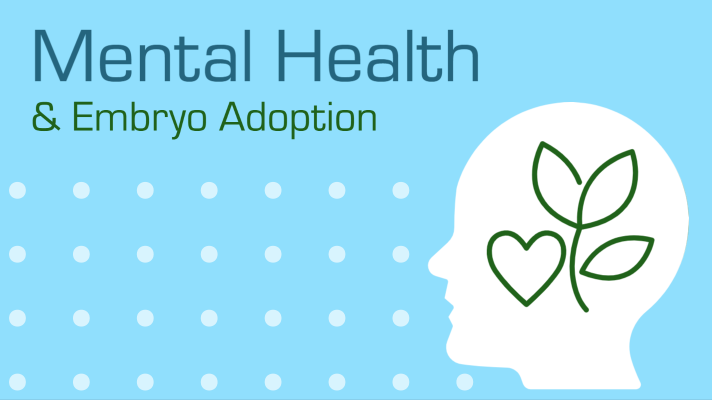May is Mental Health Awareness Month. Millions of individuals struggle with mental illness. In fact, 57.8 million adults around the world struggled with some sort of disease of the brain in 2021. Families who are donating their embryos are no exception to this statistic.
Here are three things adoptive and recipient families need to take into consideration about the mental health histories of embryo donor families:
- There is strong possibility that embryo donors will have identified diseases of the brain in their family medical history. This can include anxiety, depression, ADHD, autism, and even schizophrenia or bipolar.
- There is no one single cause of mental illness; over-diagnosis and misdiagnoses are commonplace (even with the current methods of diagnosis). Genetics may play a role, but it is not the only factor.
- Adopting embryos which are biologically related to individuals who suffer from mental illness does not guarantee your child will struggle with the same (or any) mental illnesses.
Does this surprise you?
Mental illnesses are diseases of the brain—just like any other organ in the body might experience disease.
In the United States, rudimentary data about mental illness was collected starting in 1840, but the first standardized psychiatric classification (The Statistical Manual for the Use for Institutions for the Insane) was not published until 1918. In the early 1950s, the Diagnostic and Statistical Manual of Mental Disorders (DSM-1) was published, classifying all the known mental disorders and symptoms associated with them.
With the increase in research and knowledge of different effects medication had on patients, mental health professionals have developed a more precise diagnostic system and treatment options for mental disorders. They found these individuals could successfully be treated, just as any other disease of the body could be treated. Today, the DSM-5 guides the classification and helps psychiatrists eliminate and more accurately diagnosis mental disorders.
However, even with the increased education and resources surrounding mental illnesses, there is still a stigma attached to those who suffer from it.
For example, while families looking to adopt embryos have a tendency to be more open to instances of anxiety or depression in embryo donor families, while less are open to more “severe” diagnoses, like autism, schizophrenia spectrum disorders, or bipolar disorders.
There is hope for individuals with mental health disorders, including schizophrenia and bipolar. Early detection and new treatment options, including medications and therapies, are consistently developed and have resulted in positive outcomes.
Please read our previous blog post about mental health concerns in embryo adoption for more detailed information about autism, schizophrenia, and bipolar disorders. Gaining an understanding through education will help lower the mysticism and fear associated with these mental disorders and the adoption of embryos.
We would also encourage you to watch our video Schizophrenia, Bipolar Disorder, & Embryo Adoption to learn even more about these mental disorders, and how it may influence your decision to adopt embryos.
To learn more about embryo adoption and donation, visit EmbryoAdoption.org.


Recent Comments